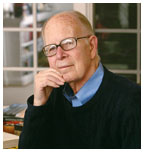
|
January 24, 2007: A moment with...
(Frank Wojciechowski) |
Robert Fagles
Rarely is the publication of a 2,000-year-old classic a literary event celebrated in the mainstream media, but Robert Fagles’ new translation of Virgil’s epic poem, The Aeneid, is an exception. His previous translations of The Iliad and The Odyssey were best-sellers and won critical raves. Fagles, the Arthur W. Marks ’19 Professor of Comparative Literature, emeritus, was awarded a National Humanities Medal this fall. He recently spoke with PAW’s Mark F. Bernstein ’83.
How do you start to do a new translation of an ancient poem?
I have two principal sources. I have a text of the poem I want to translate, along with the lexicons and commentaries and learned disquisitions. Then I have another text, which is very different. It’s the text of modern English poetry, from Whitman to the present. My job is to bring those two big texts together into some sort of mutual focus, to make it seem that Virgil comes from an English tradition and that a great English tradition stems from Virgil.
Is it true that, in preparing to translate Virgil, you taught yourself Latin all over again?
I began late to study Latin and Greek, in my junior and senior years at Amherst. But I had two great advantages. One, I was eager to learn. Two, I had remarkable teachers. I was drawn to Greek in college more than Latin. It was not until later, after I finished translating The Odyssey in Greek, that I turned back to Latin, went back to the notes that I had taken in school and the texts that we had been assigned, and tried to read a lot of Virgil in Latin. It was a job of relearning what I had learned before, but learning it better.
Have you been surprised by the commercial success your translations have enjoyed?
I have been struck by wonder, and with thanks. I never imagined that these books would draw a readership outside the walls of the academy, which has been especially satisfying. It has renewed my faith that Americans of every age and station are inveterate readers. The academy, even one as great as Princeton, has no corner on that market.
You have written your own poetry, as well. How does that compare with translating the poetry of others?
It is very hard for me to say because I do not do both equally. But I think there’s a good deal more creativity in the act of translation, and a good deal more room for translation in original writing than is thought.
It has been said that Homer is a world, and Virgil is a style.
I certainly agree that Homer is a world, but I would want to say that Virgil, as a style, enacts, dramatizes, and presents a whole world — that of history.
The Aeneid is also a work of political propaganda. What are your thoughts about that?
Whether the emperor Augustus encouraged it (though he probably did not order it), Virgil undertook to produce a great national epic celebrating the founding of Roman civilization. And this he does in triumphant terms. But nowhere does he eliminate, in the interests of triumphalism, the sadness at the heart of life, the sacrifices we have to make, the duties we are commanded to perform, often at the cost of our own self-assertion. There are at least two voices in Virgil. One is the official trumpet sound of empire. The other voice is the one that sounds the price of empire exacted from the private citizen in will, dedication, and ability to suffer.
The Aeneid is a poem about empire, but it seems to me equally about the price of empire, and that price is very steep, and it’s a price we seem to keep paying, generation in and generation out. The world is a world of tears, as Virgil presents it, and not simply a world of trumpets blaring and bronze-armored troops marching in formation. And if we can react to both those voices, hear the one reinforcing the other, the hope is that we’ll be much more complete as citizens, more seasoned and humane, neither raving patriots nor weeping fools.
Does The Aeneid, then, have particular contemporary resonance?
I think so. Anything as timeless as The Aeneid, The Iliad, or The Odyssey is almost bound to be timely, in its own sweet way. When we invaded Iraq, a reporter asked me, “Is there a Rumsfeld in The Iliad?” and I had to answer, “Not that I know of, but isn’t one enough?”
Is there a modern equivalent of the epic poem?
You’re not looking for an exact equivalent, you’re looking for
an analogue. I, for one, would find analogues in Homeros by Derek Walcott,
in Paterson by William Carlos Williams, in The Cantos
by Ezra Pound. People say we’ve lost the epic vision. Perhaps. But
we’ve never lost the epic aspiration, the aspiration to produce
a magnificent long and large national poem that can somehow encyclopedically
include all that it means to be part of a great civilization. That’s
an aspiration that seems to recur with every generation. ![]()

